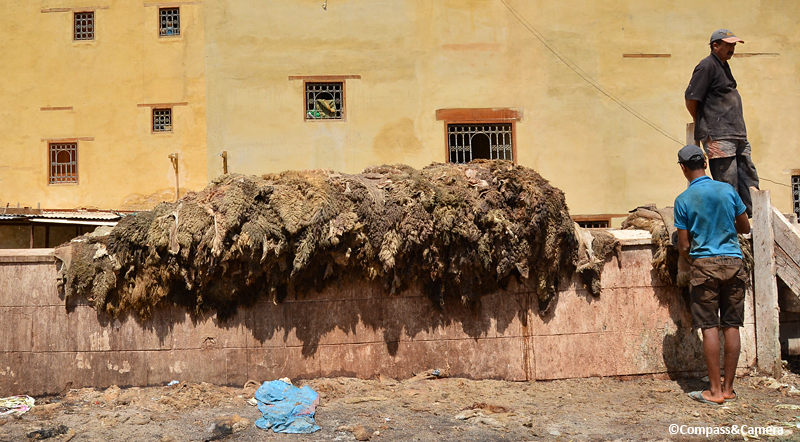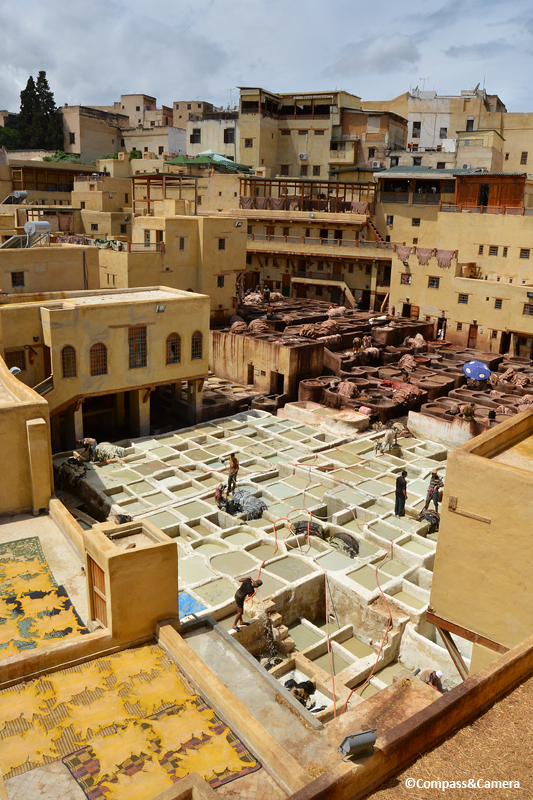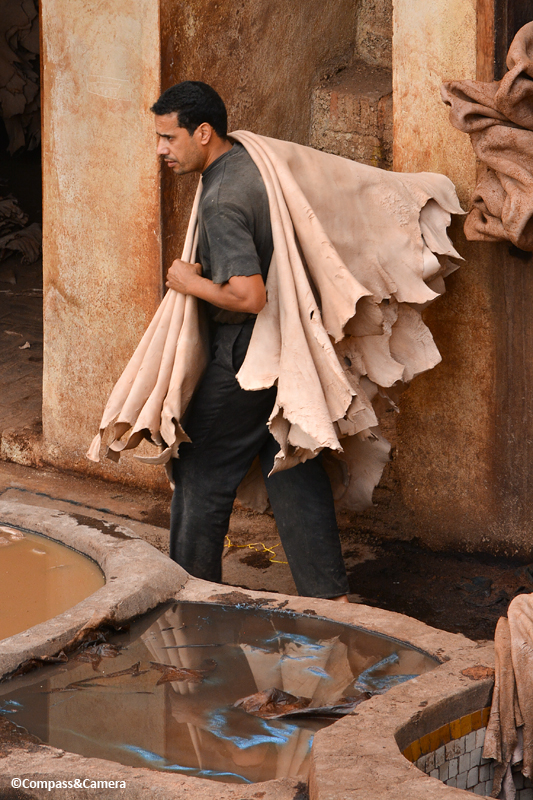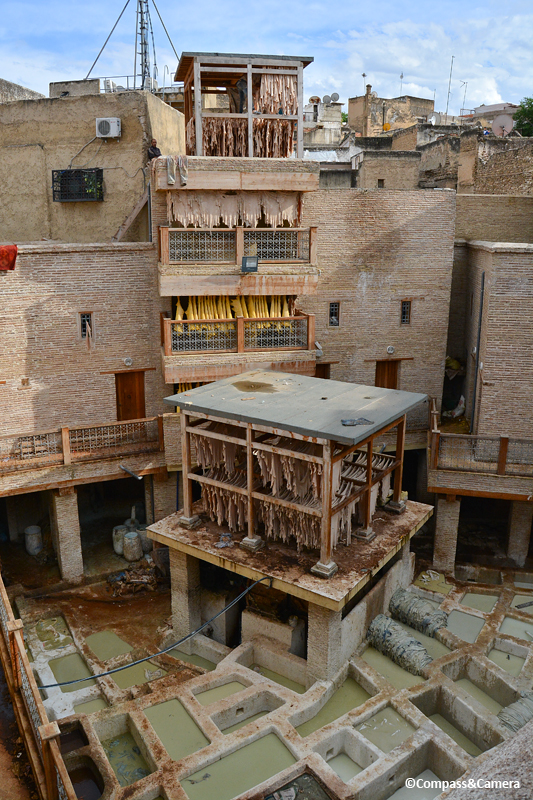Into the Tanneries of Fez, Morocco
Travelling, one accepts everything; indignation stays at home. One looks, one listens, one is roused to enthusiasm by the most dreadful things because they are new. Good travellers are heartless.
~Elias Canetti, The Voices of Marrakech
Death hangs constantly in front of us as we visit the Chaouwara tanneries in Fez. In the West, we rarely see where our food comes from, or our leather products come from. But here in Fez, we confront the truth directly as an aspect of life in Morocco.
We wind our way upstairs through the leather shop onto a large terrace overlooking the tanneries. Our guide/salesman gives us a bit of mint to hold in front of our noses to mask the acrid smell of skin, lime, urine and pigeon dung. What’s transpiring in the tubs below is far less glamorous than all the colorful leather products on display inside.
The process of tanning leather by hand is arduous and toxic. Hair and flesh is removed from animal hides (mostly goat, from what we can tell) through techniques like soaking, salting, liming and scudding (trimming). Hides are submerged for hours or days and treated with enzymes and acids. In a sort of morbid, closed-loop production process, the natural byproducts of life — salt, urine and dung; from numerous sources — is applied to the hides to preserve them, make them pliable, and condition them for their end use.
Only some of the men working these tanneries wear gloves and boots. Others are submerged thigh-high, unprotected into watery contents of every color. No one wears a mask. This is a job that endangers and shortens lives.
What looks like mad chemistry to us surely has order and process from centuries of practice. Each man carries out his task alone. Hides go in, hides come out. Hides are dyed in various hues and set aside to dry. Nature holds an entire palette of plant-based, natural dyes but these days many colors are achieved through the use of unhealthy synthetic chemicals that pollute bodies and environments.
Dry hides are carried out and somewhere in some room within the labyrinth of Fez, workers are busy sewing the skin into shoes, skirts, jackets and handbags — made to order if you can’t find exactly what you’re looking for in the shop.
Wandering through Fez the following day, we meet a boy on the street who offers to show us another tannery. We follow him down a few narrow paths to a sturdy wooden door. Behind the door we find more death — enormous piles of hides with the hair still attached, somehow seeming more alive than the hides from yesterday.
This tannery is a smaller operation. The tubs sit at ground level surrounded on all sides by stairs, balconies, drying racks and doorways leading to the unknown — maybe housing for the men who work here. Most men working the tanneries are born into the job and carry it out for a lifetime. But many of them suffer from exposure to toxins through their skin and lungs. Breathing at a tannery for just ten minutes is proof enough that this a dangerous job. But for these workers it’s a way of life in an industry that shows increasing worldwide demand for beautiful leather goods from companies like Coach, Hermès, Louis Vuitton, Prada and even VF Corporation (a company I used to work for).
We climb the stairs for an overhead view into the stewing maze below us. Two men seem to be debating an issue in one of the tubs. “What do you think? Is it ready? I don’t know. Do you like the color?”
At the top of the stairs we emerge onto a rooftop where more skins are drying but the view of the blue sky feels hopeful and fresh. Our young guide shows us the bags of pigeon dung on the way out — collected and sold to the tanneries from a town nearby.
As always, traveling has taught me another lesson: be aware of the lives you affect by the choices you make. Do I really need a pair of those blue Moroccan slippers? Judging by their pretty design, one would never suspect the pain behind the product.






























Thank you for sharing this article and your insights in this questionable tourist industry.
LikeLike
Thanks for your thoughts, as always. Hope you’re enjoying the weekend somewhere wonderful.
LikeLiked by 1 person
Fascinating and great photography…brings the story to life.
LikeLiked by 1 person
Thank you, Michael!
LikeLiked by 1 person
Wow, tour Kenya next, I’ll take you around
LikeLike
Hey Kevin! I haven’t been to Kenya yet, but I can’t wait to go there someday. Hope to meet you and take you up on your offer. 🙂 Nice blog you have — your thoughts, voice, interest in protecting nature are so needed in this world. I look forward to reading more from you! Thanks for getting in touch.
LikeLike
This is really an eye opener. Thanks for sharing, Kelly.
LikeLike
Thanks, Daeng! Hope all’s well in Singapore!
LikeLiked by 1 person
I rarely read opening quotations for some reason (I think I want to get to the meat!), but this one really grabbed me. It, along with your observations and ruminations, is certainly thought-provoking. All these years of being vegetarian, I have rarely paused to think hard about leather (and when I have, I quickly and conveniently divert my mind because I like leather!). These kinds of jobs in and of themselves make me think in a terribly circular loop; as you say, they are born into them and probably have few other options, so should our squeamishness and larger-world concerns push us to change things outside our own sphere (whether by not buying or trying to change the industry), or do we squeeze our eyes closed and hope for the best for them? Travel opens up so many beauties and pleasures but also plenty of inquietudes!
LikeLike
Inquietudes — great word choice, Lex. And I agree with your thoughts about wondering what the best way forward is. I often think as travelers we have it easy — we get to see what we choose to and leave when we want to, often hoping for the best, as you said. But I think the more one travels, the harder that gets. The realities of life around the world become clearer (and harder to accept) with depth and distance. Thanks for your thoughts! xo
LikeLiked by 1 person
Very thoughtful post Kelly, and wonderful photographs as usual. I remember visiting the Fez tanneries when I was 30, and with nothing like the awareness that I have now of the inequities of life, and the things people endure to survive. What I remember the most is the smell. I bought a small duffel bag, one of the beautiful soft leather bags Morocco is famous for, without a thought as to the suffering that went into making it. It saddens me, not least because there’s no easy answer. Even perhaps some strict laws about protective clothing would probably go a long way towards improving things though I can’t imagine that happening in Morocco. I think of so many people all around the world who work in the most dire situations. I wish I had a magic wand.
Alison
LikeLiked by 1 person
Thanks for your thoughts, Alison. Exactly right — no easy answer, although I do have some hope for Morocco. I read recently that somewhere in Fez they’ve built a plant to remove some of the metals released in the water from the processes of the tanneries. Seems like a positive step but it doesn’t really help the average worker who is standing in chemicals all day long. I’m not surprised you remember the smell — it’s unlike anything anywhere. Thanks for your thoughts! Hope you’re well.
LikeLiked by 1 person
This kind of job reminds me of what the men in Kawah Ijen in East Java do for a living. Despite the noxious gases, they go down the crater to quarry solid sulfur and carry big chunks of yellow slabs over their shoulder up and down the mountain every day.
“Do I really need a pair of those blue Moroccan slippers?” this is a kind of question I constantly ask myself whenever I travel to places where the locals have to resort to very demanding jobs to make ends meet. I can imagine myself asking the same question when I go to Fez one day; on one hand I know the damage those chemicals cause to the local men’s bodies. But on the other hand buying those products would supposedly help the local economy. I usually end up not buying, because I don’t know where to put them in the house.
As much as we ‘discover’ and learn new things when we travel, it seems like we’re also inevitably confronted with situations like this where the answers to our questions are anything but obvious. Thanks for this thought-provoking post, Kelly! This is a kind of post that reminds us to always question our values.
LikeLiked by 1 person
Hey, Bama! I vividly remember your blog post on Kawah Ijen. I came away with the same kinds of thoughts you’ve shared here. I think it all comes down to a universal human truth — we all do whatever it takes to get through life and sustain ourselves with the basic necessities. I’m sure if I were a worker in Kawah Ijen or Fez I would do the same thing. And I really think it’s fundamental that we all understand that about each other. You’ve nailed the conflict — do you say no and cut the demand for the product or say yes to support the person producing it? It is a very hard question. But in Fez, at least, I felt that any money I spent on leather would more likely fill the pockets of the shop owner, with little chance for it to trickle down to the guys in the tubs. Heartbreaking, on so many levels. Thanks for sharing your insightful comments. Always a pleasure to hear from you!
LikeLiked by 1 person
The quote you have used here really nails it about travel. This eye-opening view of the behind the scenes situation in tanneries is of course just one example of the horrendous conditions endured by so many people around the world as human beings try to care for their families….and in the news again, just this morning about child labor in the collection of cobalt used in most of our tech gadgets. The underbelly of the world is hard to witness and leaves one torn with conflicting viewpoints; nothing is ever clear-cut. The coal industry here in the USA is one example of our own exploitation of generations of men.
Travel raises our awareness and is the teacher for our consciousness.
LikeLike
Thanks for sharing your thoughts! It’s hard to remain hopeful when so many industries require child labor, unsafe working conditions and the exploitation of natural resources and ecosystems. Solar and wind power seem like positive developments amidst a lot of bad news but in developing countries, the cheapest options (like coal) are often the only options — and are often the most damaging, too. We have such a long way to go.
LikeLiked by 1 person
What a revelation! This is a side of Fez I would never imagine and have not seen anyone talk about. There is something both horrible and poetic in your photographs of the tanning pools nestled among the living quarters. I reflect on the unhealthy working conditions of the leather workers, but also of how they rely on this industry as they have no other livelihood.
LikeLiked by 1 person
Thank you! Horrible and poetic sums it up perfectly. This was a hard post to write for the exact reasons you’ve mentioned. It’s an unhealthy industry but these men need a way to earn a living. Thanks for sharing your thoughts!
LikeLiked by 1 person
Beautiful story and photos you shared. I visited that place around 5 years ago but I still remember clearly the smell. But indeed, it’s precious experience to see the tannery itself.
LikeLike
It’s kind of amazing how the smell is such a strong, unforgettable memory for people who have visited these tanneries. Thanks for reading and sharing your thoughts, Nurul!
LikeLiked by 1 person
Amazing. I will think twice before purchasing leather products!
LikeLike
Vicki! So nice to hear from you! Thanks for your inspirational comment! If we all think harder about our purchases the world will change for the better. XO
LikeLike
You’re welcome 😄
LikeLike
“Centuries of practice”. There are those who would suggest centuries of practice implies an ancient wisdom, and to change it would be to spit in the face of tradition. Yet much of what we’d consider modern progress is based on doing exactly that, sometimes introducing a different evil. Where to draw the line? It seems like change is needed to make it at least a little less hazardous, but I suspect it’ll take baby steps.
LikeLiked by 1 person
Dave, thanks for your insightful comment on this post. You make a great point about tradition vs. progress. That applies to just about everything these days! Thanks for reading and sharing your thoughts.
LikeLiked by 1 person
Thank you Kelly for such a thoughtful post on the tanneries in Fez. And fascinating photographs too!
We visited about ten years ago and it is not an experience one can easily forget. And your post brought back all the visuals, the stench, the morbid fascination. In addition to the horrors brought about by inhaling and skin absorption of toxins that the workers endure, I could not help but be put off leather by the acknowledgement of the death of so many living creatures to satisfy the leather demand. It is as you say, that when one sees it and the reality sinks in that we can have an educated response to the many industries and products that most of us do not think about, before making a purchase.
If there was less demand, less animals killed, less workers poisoned. I know it is not happening and I know that the workers rely in their jobs to make a basic living. No easy answers.
Your quote is perfect!
Peta
LikeLiked by 1 person
Peta, I’m so late in responding but thank you for your thoughtful comment on this post. It’s an endless cycle, hard to disengage from. Every little bit of awareness helps. Thanks for reading. Hope you and Ben (and Nilu!) are well. ~K.
LikeLike
Not all riches of knowledge that come from traveling the world, are always pleasant. But, still fascinating nonetheless.
LikeLiked by 1 person
Hey Kevin! Sorry for the late reply. Love your comment — true and well said. Thanks for reading. I’ve been swamped with work. Hoping to post some new content soon!
LikeLiked by 1 person
No worries. Been swamped myself.
LikeLike
Fascinating post, Kelly, the opening quote sets the stage very well “One looks, one listens, one is roused to enthusiasm by the most dreadful things because they are new…” Your photos and words mesmerize, there is beauty in all you show ~ with the obvious sadness being the people exposed to dangerous conditions without a second thought. A common plight in poorer communities around the world. And you also mention VF Corporation, which is one of my downstream customers, and while there are continual regulations/certifications/etc… to ensure the improvement of conditions, there is still a long way to go. Great post.
LikeLike
Hey, Randall! Great to hear from you. Just catching up with comments tonight after a loooong bout of work and deadlines has kept me away from the blog. Thanks so much for your comment. That intro quote did all the work for me, I think! Such profound truth in that statement. Interesting to share a VF connection with you. Agreed — still a long way to go, all over the world. Hope this finds you well wherever you are! ~K.
LikeLike
Wow I’ve only ever been to marrakech, would love to explore fes one day too
LikeLike
Yes! Definitely worth the trip! Thanks for reading and sharing your thoughts, Sheena. 🙂
LikeLike
Another Wow! I do remember the smell of rotting flesh outside the tannery., Reminded us of something medieval, except for how hard it was to find alcohol! Travel broadens our thoughts for sure.
LikeLike
Ha! Thanks, Ron! It is indeed a challenge to find a beer or glass of wine. We brought a bottle of gin from Spain which made all of our sunsets a little more beautiful. 🙂 Thanks for reading and sharing your thoughts! Your road trip looks AMAZING, btw. We just left BC and considered a similar trip before we left. No doubt you are having a blast! The wilderness is second to none. ~K.
LikeLike
Tomorrow we drive and camp along the Denali Highway, supposedly one of the most scenic drives ever. Love BC too!
LikeLike
Sounds incredible!! Enjoy every minute!
LikeLike
A fabulous post on the tanneries, a site that still haunts me to this day. Loved your shots of the hides out in the open, drying — we didn’t see that. And also the little leather poufs. We even bought one in a shop before we saw the tanneries. Not sure I would have bought one after seeing the labor and the threat to the lives of the men who process the hides. Thanks for posting!
LikeLike
Yes, we bought a pouf too and wondered if we should have! Thanks for reading, Rusha! Always great to hear from you. Stay healthy. ~Kelly
LikeLiked by 1 person
Incredible photos, looking at them, I kind of was there. Thanks for this opportunity!
I have never read such details before …I’m impressed!
LikeLiked by 1 person
Thank you, Darina! So happy I could take you there with my photos. 🙂
LikeLike